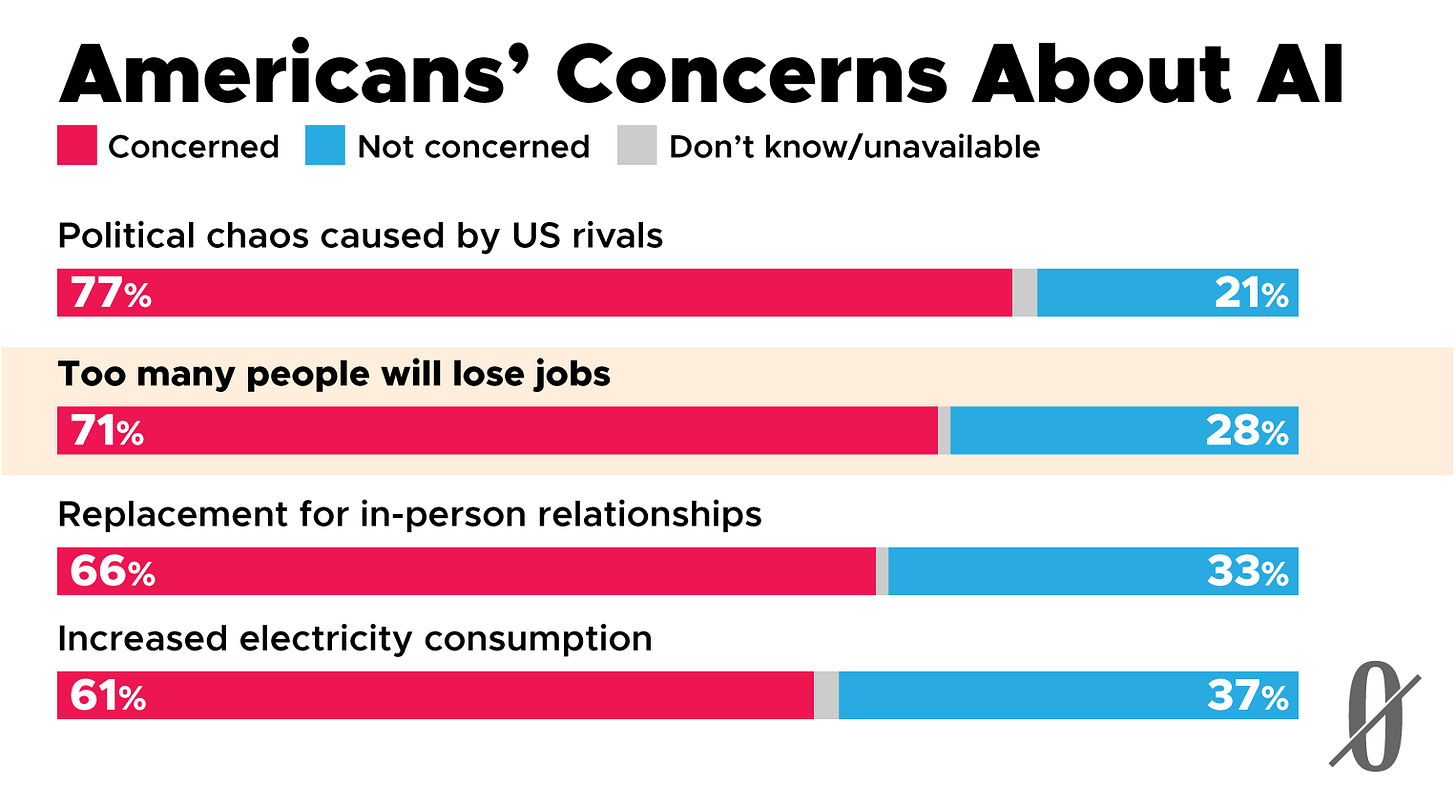Israel Lays Bare Its One-State Solution
Plus: Cracking the Trump code, America’s Caribbean escalation, ants on the loose, AI malaise, and more!
Historians may someday view this as the week when the final nail was driven into the coffin of the two-state solution—or maybe, given how unlikely this solution had already become, the week when the final hammer blow fell on the final nail. Israel approved a 3,400-unit settlement near Jerusalem that observers have long said would render a contiguous Palestinian state in the West Bank hopeless (a consequence celebrated this week by Israel’s finance minister). Meanwhile, the incremental ethnic cleansing of the West Bank continued via settler attacks on Palestinian villagers, and the prospect of the wholesale ethnic cleansing of Gaza got clearer: As Israel prepared to invade and thus depopulate Gaza City, Israeli officials talked to officials in South Sudan about relocating Gazans to their country.
We begin this week’s Earthling with several items that flesh out some of these developments and their context.
And speaking of context: Within America’s foreign policy establishment, it has long been conventional wisdom that the increasingly grim plight of the Palestinians could have been averted had they not rejected past offers of a Palestinian state—in particular, the deal that was on the table at Camp David in 2000. (As it is sometimes put, the Palestinians have “never missed an opportunity to miss an opportunity.”) In 2002, I wrote a piece for Slate critically evaluating the claim that the Palestinians were offered a good deal at Camp David—or were even offered an actual state. If you’re among those who think the Palestinians have never missed an opportunity to miss an opportunity, I encourage you to read the piece.
—Bob
—The birthrate in Gaza has dropped by 41 percent since 2022 as premature births and congenital defects increased, a group of medical researchers and Gazan doctors write in the Lancet. The decline greatly exceeds that in war-torn Ukraine, where birthrates have dropped by 25 percent—and in that case much of the decline is due to the exodus of young Ukrainian men and women to other countries. In Gaza, “the systematic prevention of births through the deprivation of food, fuel, and obstetric care is a consequence of an ever-tightened blockade,” the researchers write.
—Israel called up 60,000 reservists as part of a plan to invade Gaza City, an operation that could start within days, according to Israeli officials. The move came three days after hundreds of thousands of Israelis marched in Tel Aviv to demand a ceasefire. Meanwhile, Hamas accepted a ceasefire proposal developed by Egyptian and Qatari mediators, who say it is virtually identical to one the US proposed in June and Israel had indicated it would accept. But on Thursday Netanyahu said Israel wants all hostages released at once, whereas the new proposal, like the June proposal, entails the release of only half the hostages.
—Aharon Halevi, a retired Israeli general who was in charge of military intelligence during the Hamas attack in October of 2023, said in a leaked recording that “for everything that happened on October 7th, for every person on October 7, fifty Palestinians must die. It doesn’t matter now if they are children.” Such a high death toll (which has now been exceeded) would serve as a “message to future generations” of Palestinians. Halevi, who retired in April 2024, is seen in Israel as a centrist critic of Prime Minister Benjamin Netanyahu’s government.
—Israeli officials have held talks with South Sudan about resettling Palestinians from Gaza, the New York Times reports. Israel claims that a mass exodus of Gazans would simply be “voluntary migration,” while rights groups and legal experts argue that such a move would constitute the war crime of forced displacement (often referred to as ethnic cleansing), since Israel has systematically rendered life in Gaza perilous. South Sudan has struggled to maintain stability and feed its people since gaining independence in 2011.
—Pakistan won cherished concessions from Trump, the Washington Post reports, after Pakistani officials launched a charm offensive that included collaboration on a Trump family crypto venture, a pledge to nominate Trump for the Nobel Peace Prize, and the enlistment of lobbyists close to Trump. The Trump administration has placed a relatively low tariff of 19 percent on Pakistani goods (in contrast to a 50 percent tariff on Indian goods) and designated a Pakistani separatist group a foreign terrorist organization. “We couldn’t ask for more,” a former Pakistani lawmaker told the Post.
—In an effort to woo Trump following his Alaska summit with Russian President Vladimir Putin, Ukrainian President Volodymyr Zelensky heaped praise on him and even wore a suit to the White House, abandoning the trademark wartime garb that got bad reviews during his last visit to the Trump residence. European leaders also cranked up the flattery, with NATO’s secretary general repeatedly thanking “dear Donald” for his leadership. The compliments appeared to help nudge Trump toward supporting security guarantees for Ukraine, though he remained wary of any commitments involving American boots on the ground.
—The White House has developed a system for evaluating how strongly US companies back Trump’s policies, focusing initially on responses to the Big Beautiful Bill, Axios reports. The results remain private, but Axios says top performers include Uber and United, both of which have praised parts of the legislation. Underperforming enterprises need not panic yet, according to an anonymous White House official, who suggests that if companies “want to start advocating more now for the tax bill or additional administration priorities, we will take that into account in our grading.”
—Donald Trump’s threats to double tariffs on goods from India—a country long viewed as a counter to China—are straining US-India relations and pushing New Delhi to rebuild ties with Beijing, the New York Times reports. The two Asian giants have begun smoothing over border disputes, restoring travel links, and holding high-level talks. One retired Indian diplomat wrote last week that China offers India and the rest of the developing world an important counterbalance to “Trumpian chaos.”
—The US is deploying warships and thousands of personnel to Caribbean and Latin American waters, giving Trump a range of military options for attacking Venezuelan gangs and Mexican drug cartels, both of which he recently designated as foreign terrorist organizations. The move is “mostly” about “sending a message,” CNN reports, but military sources tell journalist Ken Klippenstein that the president intends to launch strikes by mid-September. Daniel Larison warns in his newsletter Eunomia that such a move would “achieve nothing except to produce more violence and upheaval in the affected countries.”
—AI could hollow out New York and San Francisco even more dramatically than deindustrialization depopulated Pittsburgh and Detroit, Oxford economist Carl Benedikt Frey argues in the New York Times. AIs, he says, could have this effect not just by replacing workers, but by allowing managers to offshore jobs—when, for example, “AI writing tools enable less-skilled writers, including nonnative English speakers, to create professional-quality documents.”

—When researchers asked ChatGPT to evaluate 217 scientific papers, it gave generally favorable reviews, and when asked about 61 claims made within the papers, it declared them valid. What the chatbot didn’t note is that all these papers had been retracted. But don’t pin all the blame for this lapse on AI: Journal editors, reluctant to draw attention to their mistakes, often publish retractions without linking them to the original article, making it hard for even humans to discover them, said computer scientist Debora Weber-Wulff in Chemical & Engineering News.
—An MIT study found that 95 percent of corporate AI pilot programs have failed to increase profits, Fortune reports. But, one of the study’s authors told Fortune, that may largely reflect the shortcomings not of AIs but of humans—humans who do a bad job of adapting the technology to their company’s needs. The report also acknowledged the pervasiveness of “shadow AI”—the unsanctioned use of AI by individual employees—and the challenge this presents to measuring AI’s full impact on profit and productivity.
—The “black market ant trade” is “getting out of hand,” and Trump is to blame, according to Wired. Federal staffing cuts initiated by Trump’s DOGE initiative have fallen particularly hard on the USDA department that monitors ant smuggling, leaving ant traffickers feeling emboldened. “The invasiveness potential is just off the charts,” a former USDA invasive species expert told Wired. But a USDA spokesperson says there’s no need to get all antsy, since the agency “has not changed or diminished" its enforcement or inspection process.
—Despite rising temperatures, the melting of Arctic sea ice has dramatically slowed since 2005, the Guardian reports. Scientists say warming trends are “probably” being counterbalanced by natural ocean current variability but that melting is likely to rise again in 5 to 10 years and that long-term losses—including a halving of Arctic sea ice since 1979—remain real planetary threats.
Banners, images and graphics by Clark McGillis.










In his book Mythologies Without End (2021) Jerome Slater effectively makes the argument that it is the Israelis who never missed an opportunity to miss an opportunity.